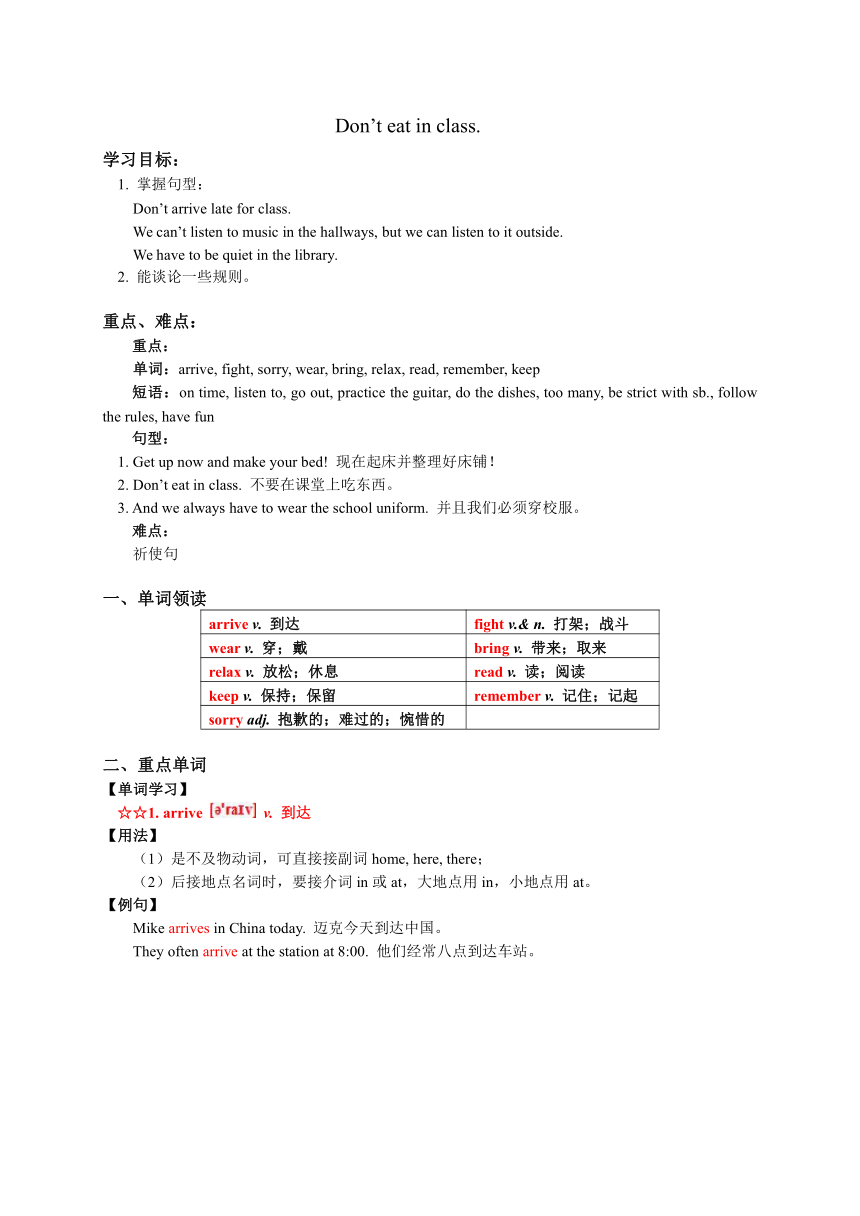
Don’t eat in class. 学习目标: 1. 掌握句型: Don’t arrive late for class. We can’t listen to music in the hallways, but we can listen to it outside. We have to be quiet in the library. 2. 能谈论一些规则。 重点、难点: 重点: 单词:arrive, fight, sorry, wear, bring, relax, read, remember, keep 短语:on time, listen to, go out, practice the guitar, do the dishes, too many, be strict with sb., follow the rules, have fun 句型: 1. Get up now and make your bed! 现在起床并整理好床铺! 2. Don’t eat in class. 不要在课堂上吃东西。 3. And we always have to wear the school uniform. 并且我们必须穿校服。 难点: 祈使句 一、单词领读 arrive v. 到达 fight v.& n. 打架;战斗 wear v. 穿;戴 bring v. 带来;取来 relax v. 放松;休息 read v. 读;阅读 keep v. 保持;保留 remember v. 记住;记起 sorry adj. 抱歉的;难过的;惋惜的 二、重点单词 【单词学习】 1. arrive v. 到达 【用法】 (1)是不及物动词,可直接接副词home, here, there; (2)后接地点名词时,要接介词in或at,大地点用in,小地点用at。 【例句】 Mike arrives in China today. 迈克今天到达中国。 They often arrive at the station at 8:00. 他们经常八点到达车站。 【拓展】 get(to) get当“到达”讲时,作不及物动词,可直接接地点副词home, here, there,但是后接地点名词时,需要与介词to搭配。 【例句】 He sometimes gets home at five o’clock. 他有时候五点到家。 What time can we get to Shanghai? 我们几点能到达上海? 【考题链接】 —When did your uncle _____ in Shanghai? —The day before yesterday. A. arrive B. get C. arrive at D. get to 答案:A 思路分析:arrive是不及物动词,后需接介词in/at,再加地点名词;get后接介词to,再加地点名词;根据空后的介词in可知用arrive。 2. fight v. & n. 打架;战斗 【用法】 (1)fight with= have a fight with 与……打架;与……争吵 (2)fight for 为……而打架;为……而战 【例句】 Look! They are fighting. 看!他们在打架。 Did you fight with your brother again? 你又和弟弟打架了? The children are fighting for playing soccer. 孩子们为踢足球而打架。 【考题链接】 The boy usually _____ with his cousin. A. fight B. fought C. fights D. fighting 答案:C 思路分析:根据时间状语usually可知时态用一般现在时;浏览各选项可知用fight的第三人称单数形式fights。 3. sorry adj. 抱歉的;难过的;惋惜的 【用法】 (1)be sorry to do sth. 很抱歉做某事 (2)be sorry for 为……而抱歉或惋惜 (3)be sorry that 抱歉…… 【例句】 I’m sorry to be late again. 很抱歉我又迟到了。 I’m sorry for being late again. 我为又迟到而感到抱歉。 I’m sorry that I’m late again. 我很抱歉我又迟到了。 【辨析】 sorry, excuse me 二者都有“抱歉”之意,但意思有差别。 (1)sorry用于事后对所犯错误或不能满足对方要求等表示歉意。 (2)excuse me常用于事前请人帮忙或打扰到别人的情况。 【例句】 I’m sorry to keep you waiting. 很抱歉让你等。 Excuse me, can I go to the library? 打扰了,我能去图书馆吗? 【考题链接】 —_____.Are you Lucy? —No, I’m not. I’m Lily. —_____. A. Sorry; Sorry B. Excuse me; Sorry C. Excuse me; Excuse me D. Sorry; Excuse me 答案:B 思路分析:请人帮忙,打扰到别人时用Excuse me;当说错话、做错事后要说Sorry。本题句意为“—打扰了。你是露西吗?—不 ... ...
~~ 您好,已阅读到文档的结尾了 ~~

